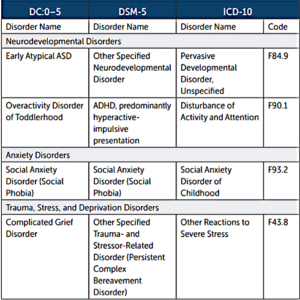Addressing mental health needs in young children is essential to sustaining positive social and emotional development. Approximately 10-16% of young children (birth through 5 years old) experience mental health diagnoses including anxiety and PTSD. (1) While therapy is an evidence-based approach to intervening on infant and early childhood mental health (IECMH) conditions, systemic reimbursement issues often make it difficult for infants and young children to get the appropriate care they need. This can lead to developmentally inappropriate diagnoses or providers failing to get reimbursed for their services.
As an initial step to address this unmet need, Children’s National, in collaboration with the Early Childhood Innovation Network (ECIN), has successfully publicized ZERO to THREE’s Diagnostic Classification of Mental Health and Developmental Disorders of Infancy and Early Childhood (DC:0-5) Billing Crosswalk on DC Health Check, a training and resource hub for health care providers in the District of Columbia on the Early and Periodic Screening, Diagnostic and Treatment (EPSDT) benefit. Mental health providers trained in the DC:0-5 can use the billing crosswalk to link specific diagnostic codes with corresponding codes from the Diagnostic and Statistical Manual of Mental Disorders, Version 5 (DSM- V) and the International Statistical Classification of Diseases and Related Health Problems 10th Revision (ICD-10) to obtain reimbursement. Providers not trained in the DC:0-5 are able to continue using the ICD-10 or DSM-V for diagnosis and reimbursement.
What is the DC:0-5 and the Billing Crosswalk?
The Diagnostic Classification of Mental Health and Developmental Disorders of Infancy and Early Childhood (DC:0-5) is a system for classification of mental health and developmental disorders for infants and toddlers up to age 5. It was established to provide developmentally appropriate diagnostic criteria for mental health disorders in infants and young children. While the majority of states, including the District of Columbia, do not offer reimbursement for the DC:0-5 under their Medicaid fee schedule, the crosswalk facilitates age-appropriate diagnosis and reimbursement with codes for the DSM-V and/or ICD-10. Picture shown below illustrates an example from ZERO to THREE’s DC:0-5 Billing Crosswalk. (2)
 Why Does it Matter?
Why Does it Matter?
In 2014-15, ZERO TO THREE surveyed state mental health directors, state Medicaid directors, and members of state infant mental health associations about their use of crosswalks. The following data represent a total of 33 states.
Access to a crosswalk allows providers to fully adopt the DC:0–5 and integrate it into their practice, as it allows payment for services that makes usage feasible. Of the respondents who reported using the previous version, DC:0–3R, with a crosswalk, many perceived benefits were identified, including the following:
- Increased ability to diagnose: Seventy percent reported increased ability to diagnose relationship and other mental health disorders in infants and young children.
- Enhanced ability to provide appropriate treatment services: Fifty percent indicated an enhanced ability to provide appropriate treatment services to young children.
- Increased ability to bill and be reimbursed: Fifty percent reported an increased ability to bill and be reimbursed for services provided to young children and their families.
Not only does the crosswalk streamline the billing and reimbursement process for IECMH providers, but it also allows more infants and young children, especially those insured by Medicaid, to access mental health care and targeted early intervention. 3,4
How to Access the Billing Crosswalk
- The full ZERO to THREE crosswalk can be found here: Crosswalk from DC:0-5™ to DSM-V and ICD-10 – ZERO TO THREE
- More information about the DC:0-5 and ZERO to THREE’s Crosswalk can be found in their 2017 Briefing Paper.
Have additional questions or want to find DC:0-5 training opportunities? Please contact cmhcore@childrensnational.org
References
- ZERO TO THREE. (2022). Infant and Early Childhood Mental Health. Think Babies. Retrieved July 27, 2022, from https://www.thinkbabies.org/policy-priorities-infant-and-early-childhood-mental-health/ Accessed March 2, 2023.
- Photo retrieved from ZERO to THREE’s Crosswalk, found here: https://www.zerotothree.org/resource/crosswalk-from-dc0-5-to-dsm-5-and-icd-10/ Accessed March 2, 2023.
Header photo from Pexels.com
About the author

Elyssa Clauson, MPH
Policy Associatefor the Community Mental Health CORE at Children's National Hospital



